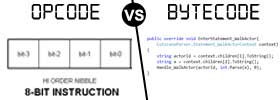Difference between Bitcoin and Namecoin
Key Difference: Bitcoin was launched on 3rd January 2009 by Satoshi Nakamoto. It is the first fully implemented peer-to-peer cryptocurrency protocol. Namecoin was created from modified Bitcoin software, and hence is quite similar to it. However, it also acts as an alternative, decentralized DNS.
 Digital currencies are quite similar to fiat currencies. Fiat currencies are currencies that are backed by the government, for example, USD, GBP, EUR, etc. Digital currencies, on the other hand, are currencies that are electronically created and transferred from one wallet (account) to another. Cryptocurrencies are a type of digital currencies that use cryptography to implement a distributed, decentralized and secure information economy. This essentially means that they are not backed by any entity and hence the account information and ownership is not tracked.
Digital currencies are quite similar to fiat currencies. Fiat currencies are currencies that are backed by the government, for example, USD, GBP, EUR, etc. Digital currencies, on the other hand, are currencies that are electronically created and transferred from one wallet (account) to another. Cryptocurrencies are a type of digital currencies that use cryptography to implement a distributed, decentralized and secure information economy. This essentially means that they are not backed by any entity and hence the account information and ownership is not tracked.
Today, there are a number of cryptocurrencies available in the digital market; however this trend was started by Bitcoin. Bitcoin was launched on 3rd January 2009 by Satoshi Nakamoto. The name Satoshi Nakamoto is a pseudonym which could refer to the original creator of Bitcoin, or a group of developers that collaborated for the creation of the protocol. Nakamoto has refused to come forward and has even handed over the management responsibilities of the Bitcoin protocol to the actual users. The users are also the ones who create new Bitcoins through a process called mining; these users are called miners. Miners need to solve equations to solve the Bitcoin block chain, which contains a list of the transaction; solving one block yields 25 bitcoins.
 The protocol of the Bitcoin is open source, which means that anyone can see how it operates. While the transparency is touted by the industry, it also allows competitors to see and modify the original protocol. Namecoin is one such cryptocurrency. It is created from modified Bitcoin software, and hence is quite similar to it. Like Bitcoin, it uses the SHA-256 algorithm. It also can be mined, up to a limit of 21 million.
The protocol of the Bitcoin is open source, which means that anyone can see how it operates. While the transparency is touted by the industry, it also allows competitors to see and modify the original protocol. Namecoin is one such cryptocurrency. It is created from modified Bitcoin software, and hence is quite similar to it. Like Bitcoin, it uses the SHA-256 algorithm. It also can be mined, up to a limit of 21 million.
However, Namecoin differs in one major aspect; it was not intended to be used as a currency. It was instead developed as a decentralized DNS. Right now, it works as both, a cryptocurrency and an alternative, decentralized DNS. An alternative, decentralized DNS allows one to register a .bit domain. This domain is outside the control of ICANN, and hence they cannot be seized or censored.
As of January 2014, 123616 .bit domains have been registered. However, the use of the .bit domain requires a copy of the Namecoin blockchain, a supporting public DNS server, or a proxy; because .bit domains are not currently awarded. Furthermore, once they are registered they must be updated for the first time and must be updated every 250 days thereafter, or they will expire. Once a domain has been registered, they can’t be taken away, they can only be transferred by the owner. Currently, one needs to use a special DNS server to resolve .bit. Also, Namecoin is merge-mined with Bitcoin, which means that a node can mine for both Namecoin and Bitcoin simultaneously at the same rate that they would mine just one.
Comparison between Bitcoin and Namecoin:
|
|
Bitcoin |
Namecoin |
|
Definition |
The first fully implemented peer-to-peer cryptocurrency protocol. |
Is a type of Digital Cryptocurrency that acts as an alternative, decentralized DNS. |
|
Type of |
Digital Cryptocurrency |
Digital Cryptocurrency |
|
Launched |
3 January 2009 |
18 April 2011 |
|
Developed by |
Satoshi Nakamoto |
- |
|
Symbol |
฿ |
ℕ |
|
Unit |
BTC or less commonly, XBT |
NMC |
|
Subunit |
0.01 = cBTC (centicoin) 0.001 = mBTC (millicoin) 0.000001 = µBTC (microcoin) 0.00000001 = satoshi |
0.001 = mNMC (millicoin) 0.000001 = μNMC (microcoin) 0.00000001 = Smallest unit |
|
Value (on February 5, 2014) |
1 Bitcoin = US$ 828.90 |
1 Namecoin = US$ 5.25 1 Namecoin = 0.006351 BTC |
|
Scope |
Largest Cryptocurrency |
|
|
Market capital (on February 5, 2014) |
$ 10,242,178,515 |
$ 41,769,523 |
|
Mined Coins (on February 5, 2014) |
12,356,350 BTC |
7,952,092 NMC |
|
Users |
International |
International |
|
Inflation |
Rate halves every 4 years |
Rate halves every 4 years |
|
Final Total |
21 million |
21 million |
|
Method |
Increasing difficulty per every 2016 blocks produced |
Merge mined with Bitcoin |
|
Algorithm |
SHA-256 |
SHA-256 |
|
Mined using |
GPUs, FPGA, or ASIC |
Merge mined with Bitcoin |
Image Courtesy: tokyocodes.com, normanshark.com









Add new comment